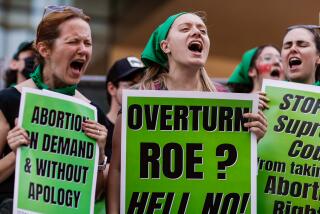Debate Begins on Abortion Rights Bill : Pregnancy: Congress takes up the issue as the Supreme Court prepares to hear a case that could curb protections established by the Roe vs. Wade decision.
- Share via
WASHINGTON — Congress is heading for a major confrontation over the emotional, divisive issue of abortion as the Supreme Court prepares to consider a case that could curtail--or ultimately even end--constitutional protections for women seeking to terminate their pregnancies.
The first skirmish between abortion rights advocates and anti-abortion forces took place Wednesday at a hearing by a House Judiciary subcommittee on a one-page bill that has escalated the longstanding controversy.
For the first time in almost two decades, legislation has been proposed that raises the ultimate issue in the dispute: Should women have a right to abortion?
The key sentence in the bill reads: “A state may not restrict the right of a woman to choose to terminate a pregnancy before fetal viability; or at any time, if such termination is necessary to protect the life or health of the woman.”
That the congressional debate begins just as the Supreme Court prepares to review a key Roe vs. Wade challenge is the result of strategy. Anticipating that a Supreme Court ruling this spring in a Pennsylvania case could give states wide latitude to erase 19-year-old Roe vs. Wade protections, abortion rights advocates hope to pass a federal law that would secure a woman’s right to terminate a pregnancy no matter how the justices decide.
Leading lawmakers on both sides of the debate say they welcome an all-or-nothing showdown on an issue that already is part of the 1992 presidential campaign. But many other members of Congress are horrified at the notion of being forced to take a stand on so volatile an issue so close to the November elections. Furthermore, some say, the proposed law actually could make abortion even freer from restrictions than it is now.
Congress has taken an increasingly favorable position in the last two years on legislation related to the abortion issue, approving bills to permit abortions in the District of Columbia and abortions in the case of rape or incest. President Bush has vetoed them, however, and proponents lacked the votes to override the vetoes.
“The United States Congress has become the last line of defense for women and families against a President and a (Supreme) Court that are determined to return America to the days when women facing crisis pregnancies had to seek health care on dirty kitchen tables or in deadly back alleys,” said Kate Michelman, president of the National Abortion Rights Action League.
An opposing view was voiced by Beverly LaHaye, president of Concerned Women for America, a Christian educational and legal defense foundation. She said: “Millions of women in our nation know that abortion violently kills a baby and hurts the mother. We want the killing to stop now.”
Bush, preserving his anti-abortion credentials, said Tuesday that he would veto the legislation if Congress passes it. The five Democratic presidential contenders, in contrast, have endorsed it.
With the backing of the House Democratic leadership, the measure is expected to be approved swiftly by the House Judiciary Committee and sent to the floor for a decision by the entire 435-member body later this spring. A similar bill is being advanced in the Senate Labor and Human Resources Committee by its chairman, Sen. Edward M. Kennedy (D-Mass.).
Proponents of the bill, including many Republicans, assume that the conservative-dominated high court again will erode--or even strike down entirely--the rights granted in the Roe vs. Wade decision handed down by a far more liberal court in 1973.
Their concerns do not appear to be groundless. In recent years--notably in its 1989 Webster vs. Reproductive Health Services decision--the Supreme Court has approved state restrictions on abortion, such as waiting periods, requirements for a husband’s consent to an abortion or parental consent for minors’ abortions. The Pennsylvania case expected to come before the court this year also involves states’ rights to regulate abortion.
Although defenders of abortion rights contend that the legislation is only an attempt to save the 1973 precedent, opponents insist that it actually would expand the 19-year-old decision, permitting abortion regardless of the age of the expectant mother or the length of her pregnancy.
“This legislation would impose on all 50 states an unprecedented regime of abortion on demand going well beyond the requirements of Roe vs. Wade and its successor cases,” Atty. Gen. William P. Barr wrote in a letter to Rep. Henry J. Hyde (R-Ill.), an abortion opponent.
Rep. Patricia Schroeder (D-Colo.), a subcommittee member who favors the bill, stared at Hyde while he stated his objections to the legislation and then engaged him in debate before members concluded a round of opening statements.
“Unless we move ahead at this time, Roe could go down the drain,” said Rep. Don Edwards (D-San Jose), chief sponsor of the bill and chairman of the subcommittee conducting hearings on it.
More to Read
Get the L.A. Times Politics newsletter
Deeply reported insights into legislation, politics and policy from Sacramento, Washington and beyond. In your inbox twice per week.
You may occasionally receive promotional content from the Los Angeles Times.










